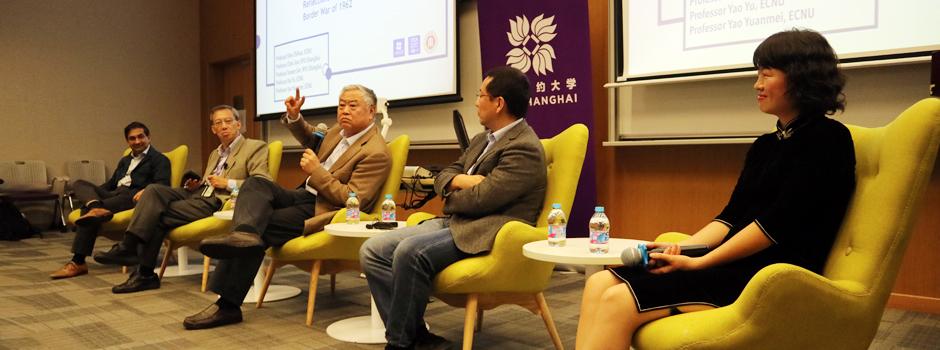On Wednesday, historians of NYU Shanghai and East China Normal University participated in a roundtable on the Chinese-Indian Border War in 1962.
Sponsored by the Center for Global Asia at NYU Shanghai, the roundtable featured Cold War expert, Shen Zhihua, Professor of History and Director of the Institute for Studies on China and Its Neighboring Countries and Regions at ECNU, and his decades-long academic partner Chen Jian, Distinguished Global Network Professor of History, NYU Shanghai, who moderated the discussion.
In her opening remarks, NYU Shanghai Provost Joanna Waley-Cohen announced that the roundtable was in part a celebration of the launch of NYU-Shanghai and ECNU Joint Research Center On Global History, Economy and Culture.
“Since NYU Shanghai’s birth, a series of joint research centers in sciences have been established, but in humanities and social sciences, there is no institutional entity that coordinates faculty efforts and resources,” she said. “The new joint research center aims to take full advantage of the profound tradition of the two universities to promote excellence in academic study and liberal arts education.” She also announced and congratulated the publication of a new book India, China, and the World: A Connected History, by Professor Tansen Sen, Director of Center for Global Asia, another speaker of the roundtable.
NYU Shanghai Chancellor Yu Lizhong and ECNU Vice President Li Zhibin, in their brief remarks, also congratulated the launch of the new joint center and publication of Professor Sen's new book.
Professor Sen, who chairs the center for Global Asia, concentrated his remarks not on why the war occurred but how the peace was lost. He pointed out a wasted opportunity to solve border issues in the 1950s, when the Chinese-Indian friendship was highlighted as “Bhai-Bhai”(brother-brother) and cultural exchanges were extensive.

“It is not just the governments, but also the two peoples who do not understand each other. It is always a comparison of how good we are rather than how should we fix problems,” he said, adding that boosting mutual understanding is essential to resolving the current deadlock.
As moderator, Professor Chen Jian also provided insightful comments for each presentation, describing the war as a “tragic moment” that ended the 1950s as a “decade of innocence”. “Yet, fifty-five years later, we are still living in the dark shadow of its negative impact. Only by going back to explore what had caused the tragic episode of history and release ourselves from the highjacking of colonial legacies, may we truly learn from the lessons of the past, so as to benefit the two nations and the whole world,” Professor Chen said.
“The Chinese-Indian Border War lasted only one month, only a small episode within 5,000 years of interactions between the two great countries,” he added. “Our purpose today is how to allow us finally to be able to stand beyond the reasons of the war and explore a new era of Chinese-Indian relations.”
The roundtable was also joined by two ECNU historians, Professor Yao Yuanmei who drew attention to the legacy of British colonial policies while Professor Yao Yu analyzed the border dispute in the context of the different domestic and international threats China faced in 1961-62.”


